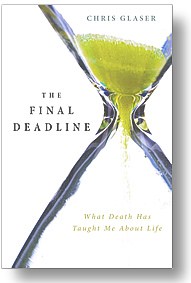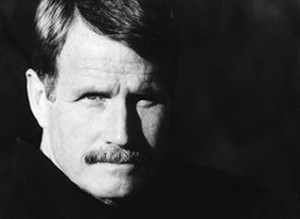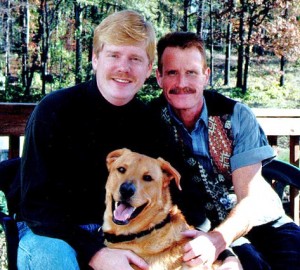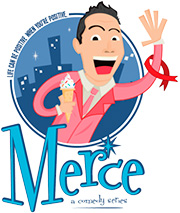My memorial service will be fabulous, I can assure you of that. I first outlined it during the initial, deadly wave of AIDS in the 1980’s, and have edited it here and there over the years, updating the songs I would like played or the video footage shown.
Focusing on the spectacle, though, may just be avoiding the facts: if it’s my memorial, that means I’m dead. And death is a subject about which I have both too much and too little understanding. I’ve seen more than my share of it, and yet I have no greater insight than the next guy.
 That’s especially true if the next guy is Chris Glaser. In The Final Deadline: What Death Has Taught Me About Life, his moving and thought provoking new book, the gay theologian and philosopher shows both awe for his topic and a likable willingness to accept uncertainty.
That’s especially true if the next guy is Chris Glaser. In The Final Deadline: What Death Has Taught Me About Life, his moving and thought provoking new book, the gay theologian and philosopher shows both awe for his topic and a likable willingness to accept uncertainty.
Glaser isn’t out to win souls for Jesus or explain “what comes next.” He leaves that to you and your own beliefs, thank you very much. He’s much more interested in examining death as it affects us, the living, those who remain. And as it turns out, death is all about life.
“Death forces us back on life, as a shut door forces us to find another passageway, a roadblock prompts us to take a detour, or a great loss encourages us to savor what remains,” Glaser writes.
Glaser segregates the book into chapters on manners of death, such as “Death by Murder,” “Death in Public,” “Precipitous Death,” and so on, and he populates his musings with stories of his many dead friends and acquaintances (“You have more dead friends than Jessica Fletcher,” a friend tells him in reference to the Murder, She Wrote heroine, and by book’s end you tend to agree).
Those friends provide lively characters and dramatic deaths from which Glaser draws insight. They include clergymen, relatives, celebrities, criminals, and pets, dying of everything from cancer to crashes (car and plane), overdose, stabbings (more than one!), gunshot, and even someone setting himself on fire on Sunset Boulevard. An impressive coterie of killings, to be sure. AIDS, of course, haunts the “Death by Plague” chapter.
Throughout, my active imagination kept indicating something miraculous or supernatural might occur, and sharing Glaser’s interest in all things, well, dead, I hoped for them. Would Glaser witness spirits leaving the recently departed? Would he sense something at his friend’s fatal crime scene? When Glaser receives the typewriter of a murdered friend who studied paranormal activity, and then leaves a blank piece of paper in the carriage, I held my breath for paragraphs, waiting for the instrument to clack out the name of the murderer or at least a howdy-do.
The damn thing never does. Instead, Glaser draws his own messages about his late friend’s untimely demise, including the value of leaving something behind, a gift for your survivors, be it in writing or in their hearts.
 The Final Deadline is really a memoir of sorts, and Glaser’s engaging honesty about his own lifelong fascination with death make him an endearing guide through sometimes morbid terrain. “Watch boxes that snapped shut were ideal coffins,” he confides about his childhood burials of departed goldfish and parakeets. He enjoyed the solemn ritual of “preparing its final resting place, covering it with earth and prayer and flowers.”
The Final Deadline is really a memoir of sorts, and Glaser’s engaging honesty about his own lifelong fascination with death make him an endearing guide through sometimes morbid terrain. “Watch boxes that snapped shut were ideal coffins,” he confides about his childhood burials of departed goldfish and parakeets. He enjoyed the solemn ritual of “preparing its final resting place, covering it with earth and prayer and flowers.”
His final chapter, “Death Made Personal,” delivers just that, as he recounts the deaths of his parents, and then the death of what he had believed his “lifelong” relationship, to a partner who was his “never-ending romantic movie,” who leaves him as a result of the HIV positive partner’s renewed health in the wake of improved therapies ” and a wanderlust for what his extended life expectancy might hold.
Glaser is dumbstruck by the abandonment, after having moved across the country to follow his partner’s career, and proving his love despite their difference in HIV status. He writes that he knew “my partner might die, not the relationship. When we bought the house, I calculated how difficult it might become for him to navigate the staircase…”
Actually, Chris Glaser is too easy on the guy. The partner, the one who built a life with him and then unceremoniously dumped him for no compelling reason, was me.
Chris’s book references The Adventures of Tom Sawyer, in which Tom and Huck have the good fortune of attending their own funerals. I had a similar experience reading this post-mortem of our breakup — but instead of hearing the praises of survivors, I saw in clear black and white the grief and confusion of the lover I left behind. The wreckage of my past is on full, excruciating display.
 “My ideal world was shattered,” he writes. “I felt worse than unloved. I felt unlovable, unattractive, undesirable. Taking things ‘one day at a time’ seemed like too big a chunk…” And his anguish and battered self esteem lead to a period of misfortune and poor choices. “I dated people who turned out to be scary in one way or another,” he writes. “I drank too much. I acted out sexually. My wallet was stolen.”
“My ideal world was shattered,” he writes. “I felt worse than unloved. I felt unlovable, unattractive, undesirable. Taking things ‘one day at a time’ seemed like too big a chunk…” And his anguish and battered self esteem lead to a period of misfortune and poor choices. “I dated people who turned out to be scary in one way or another,” he writes. “I drank too much. I acted out sexually. My wallet was stolen.”
The gay dating pool is frightening enough, but to know I thrust a good man into it, bruised and hurting and without a credible reason why, is a tough chapter to face, my friends. And yet Chris tries his best to protect me from my own history. In a book filled with intimates, living and dead, I alone go unnamed.
The truth is my drug addiction was beginning a decade-long march to destroy me, something Chris only touches upon in his recounting. My secret experimentation with crystal meth, coupled, yes, with my feelings of rebirth as a result of new HIV medication breakthroughs, was a dangerous and cunning combination.
I was a blossoming addict who wanted out: of the marriage, of the perceived limits (of what I couldn’t tell you), of anything that kept me from the siren call of the gym and the dance floor and the circuit parties and the drugs, oh my the drugs, that promised fantastical things around the corner but that somehow never arrived.
With characteristic grace, Chris moves through forgiveness and uses the puzzling experience to evaluate himself and his goals. He changes course in his lifelong struggle for Presbyterian ordination. He reads and re-reads everything that inspires him, from the bible to Gore Vidal, from To Kill a Mockingbird to Zorba the Greek.
Chris finds peace, renewed vitality in his career, and a relationship that exists to this day. As he closes the chapter, he recites a poem that once came to him in his sleep:
Love is being crucified
And rising again
As if it never happened.
That’s love for you.
That’s love for you.
Chris Glaser’s beliefs are many and steadfast, but his faith in love is his most unyielding conviction. In The Final Deadline, and in his life, love never dies.







